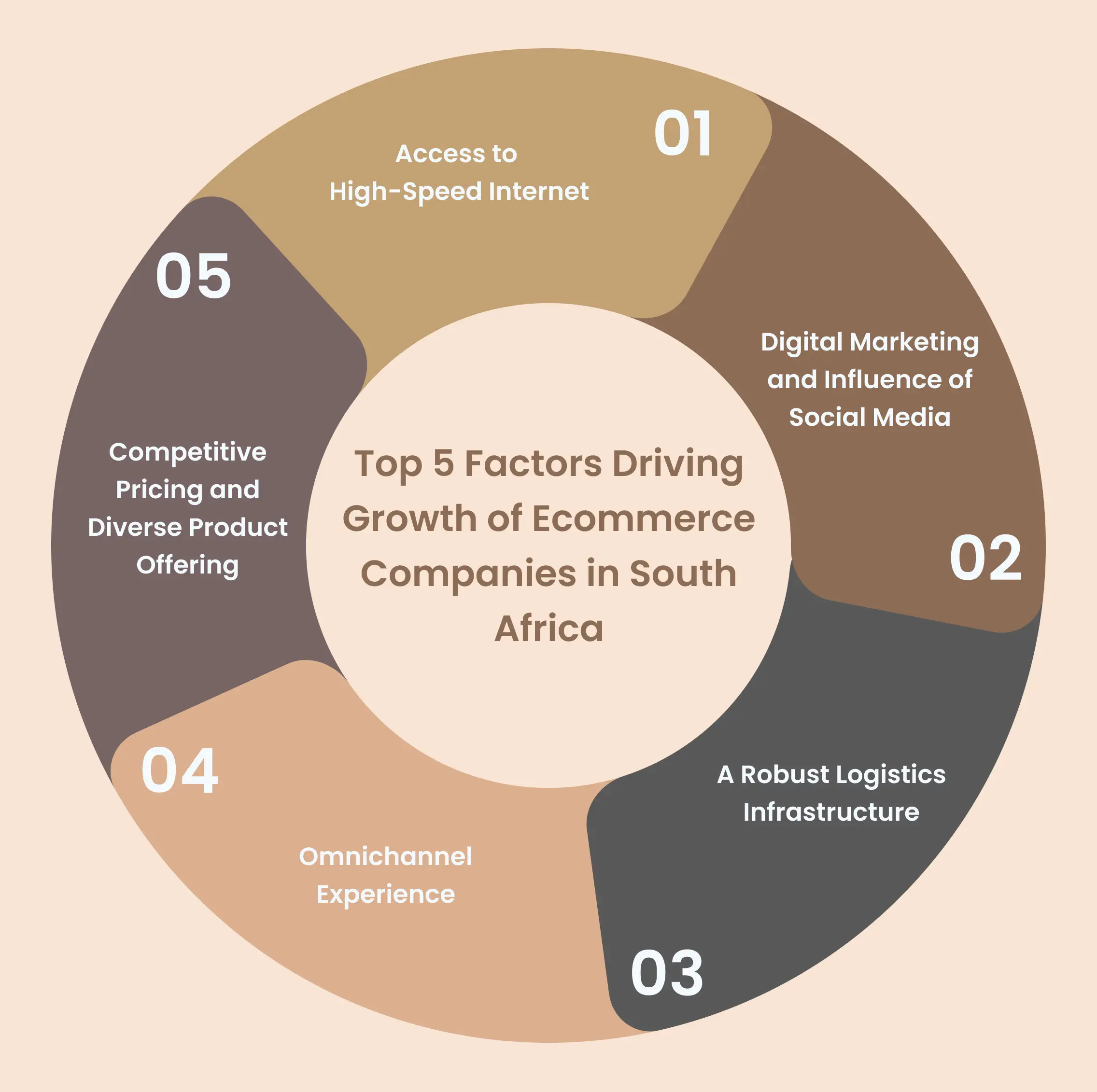E-commerce has significantly transformed retail shopping across the globe, and South Africa is no exception. The country with the fastest-growing economy in the African subcontinent is gaining momentum in online shopping. The recent economic growth, easy access to smartphones, and high-speed Internet have contributed to the surge in eCommerce adoption in recent times.
According to a Mordor Intelligence report, South Africa's e-commerce market size is expected to grow at a CAGR of 12.5 percent between 2024 and 2029. This is exciting news for companies involved in e-commerce business in South Africa and the entrepreneurs looking to launch e-commerce businesses in the country.
The top e-commerce companies are in a position to make the most of this growth. But which are those companies? In this blog, we will reveal 11 top e-commerce companies in South Africa, and the factors contributing to the growth in e-commerce business in the country.
This Article Contains:
Ecommerce Companies in South Africa
E-commerce is a flourishing business in South Africa due to increasing internet penetration and changing consumer behavior. Some companies in the country have shown significant growth and potential. We have listed 11 top e-commerce companies in terms of growth potential, revenue, and popularity.
1. Takealot

Founder: Kim Reid
CEO: Mamongae Mahlare
Year Founded: 2011
Company Size: 1,001-5,000 employees
Products Categories: Electronics, Beauty items, Books, Clothing, Shoes, Accessories, Home Decor, Appliances, Office & Stationary, Sports & Training, Toys, etc.
Revenue: $808 Million
Takealot is one of the top e-commerce companies in South Africa. Established in 2011, the company has grown rapidly to become the largest e-commerce company in South Africa. The company's user-friendly and secure website and mobile platform enjoys the trust of millions of shoppers across South Africa.
With a mission to become the most customer-centric online shopping destination in the African subcontinent, Takealot endeavors to improve the customer experience at every step of shopping, from landing on its platform and placing orders to delivering the product on time.
Achievements:
2016 PriceCheck Tech & E-Commerce Awards.
2. Yuppiechef

Co-founder & CEO: Andrew Smith
Year Founded: 2006
Company Size: 201-500 employees
Products: Kitchen Appliances, Home Appliances, Bed & Bath items, Furniture, Decorative items, Food & Drink, Gardening accessories, Picnic essentials, etc.
Offline Presence: Yes
Revenue: $23.8 Million
Yuppiechef was founded by two friends who used to sell only 32 kitchen products online. From there the company has become one of the top e-commerce companies in South Africa.
Besides a robust online presence, the retailer has opened many stores across the country to provide a smooth omnichannel experience to its customers. The customer can also place the order online and collect it from the nearest stores.
Achievements:
Winner of South Africa's Online Retailer of The Year Award.
V&A Waterfront Customer Excellence Award in 2023.
3. Superbalist

Founders: Claude Hanan and Luke Jedeikin
CEO: David Cohen
Year Founded: 2010
Company Size: 201-500 employees
Products : Women's fashion, Men's fashion, Kids's fashion, Home & Living items, Spots items, Beauty products, etc.
Revenue: $122.9 Million
Superbalist is an online fashion and lifestyle destination in South Africa. Be it luxurious brands or budget-friendly items, the e-commerce store is a perfect place to shop for clothes, shoes, and home decor items.
The company's continuous focus on making fashion shopping more convenient, secure, and user-friendly has prompted it to open a physical store across the country that allows shoppers to click and collect orders or get them delivered at home.
4. Shein

Founder & CEO: Chris Xu
Year Founded: 2012
Company Size: 10001+ employees
Product categories: Men's fashion, Women's fashion, Kids's fashion, Jewelry & Accessories, Home & Kitchen, Beauty & Health, Electronics, etc.
Revenue: $22.7 billion
Shein is a leading online fashion and lifestyle e-commerce company that offers apparel and fashion products from top brands all at affordable prices.
Founded in 2012, the e-commerce giant has expanded rapidly serving customers in 150+ countries around the world including USA, UK, France, India and Singapore.
Shein's customer-centric and on-demand model ensures there is no mismatch between customer demand and merchandise supply, improving customer experience.
5. Bob Shop

Founder: Andy Higgins
Director: Craig Lubbe
Year Founded: 1999
Company Size: 51-200 employees
Product categories: Electronics, Home, Garden & Groceries, Fashion & Jewellery, Sports & Health, Lifestyle, Automotive, Collectables, etc.
Revenue: $25 million
Bob Shop is among the top e-commerce companies in South Africa that were originally known as Bidorbuy. The company was renamed Bob Shop following a merger between Bidorbuy and uAfrica in 2022. The marketplace offers about 3 million products across 30 categories.
Bob Shop's unique business model like zero monthly fees from sellers and deliberate choice of not selling anything itself has helped the company to grow exponentially to achieve an Unicorn status, which is rare in the African continent. It is also one of the very few profitable e-commerce companies in the country.
6. Zando

CEO: Morgane Imbert
Year Founded: 2012
Company Size: 51-200 employees
Product categories: Women's fashion, Men's fashion, Kids & Babies, Homeware, Shoes, Sports, Kids & Babies, Phones & Tablets, etc.
Revenue: $2.5 million
Zando is South Africa’s premier online shopping destination for fashion lovers. It operates as a subsidiary of The Jumia Group, a prominent fashion retailer operating in many countries in the African subcontinent.
Founded by Rocket Internet AG in 2012, the e-commerce company focused on providing customer service since the beginning. It helped them to win several awards and become a household name in fashion retail and one of the top e-commerce companies in South Africa.
7. Woolworths

Founder: Max Sonnenberg
CEO: Jeanine Womersley
Year Founded: 1931
Company Size: 10001+
Products and Services: Food, Men’s fashion, Women's fashion, Kids' fashion, Home Decor, Home appliances, Kitchen appliances, Beauty care items, etc.
Revenue: $141.5 Million
Woolworths is another e-commerce company operating in South Africa. The retail giant began its journey through a physical store in Cape Town in October 1931 and opened hundreds of stores across South Africa, Australia, and New Zealand. The company went bankrupt in 2008 and shut down its high-street shops.
Achievements:
Achieved Sustainable Development Goals Champion Award at Sustainability Awards 2023.
8. Decathlon

Founder: Michel Leclercq
CEO: Barbara Martin Coppola
Year Founded: 1976
Company Size: 10,001+
Products and Services: Men's Sports Clothing, Men's Sports Accessories, Women's Sports Clothing, Sports Footwear, etc.
Offline Presence: Yes
Revenue: $3.7 Million
Founded in 1976, Decathlon is inspired to make the best sports products accessible to everyone. The online sports retailer offers high-quality sports goods at a fair price, making it a popular shopping destination for sports lovers across South Africa.
Besides a strong online presence, Decathlon also has 2,080 physical stores in 69 countries including South Africa. With an aim to generate revenue of one billion Euros, the company has recently shifted from a standard e-commerce model to a marketplace, allowing other brands to sell their products on its platform.
Achievements:
Outdoor Retailer Innovation Award.
9. Home Choice

Founder: Richard
CEO: Chris de Wit
Year Founded: 1985
Company Size: 1,001-5,000
Products and Services: Bedding, Bedding, Essentials, Blankets, Electronics, Mattress, Kitchen & Dining, Home Decor, Cleaning Accessories, etc.
Offline Presence: Yes
Revenue: $52.6 Million
Home Choice is among the top e-commerce companies in South Africa that provide high-quality homeware products at affordable prices across the country.
The company's focus is to capitalize on South Africa's growing middle class and to maximize its reach through brick-and-mortar stores as well as digital channels. Their omnichannel strategy and customer-centric policies have helped them accelerate growth and increase revenue significantly.
10. Care to Beauty

Founder: Jorge, Bruno Gouveia
Year Founded: 2015
Company Size: 51-200
Products and Services: Women's Skincare, Bodycare, Haircare, Makeup items, Beauty Accessories, Men Grooming, Mom & Baby products etc.
Care to Beauty is simplifying beauty and skincare through its intuitive and user-friendly e-commerce platform. The beauty retailer aims to provide customers in South Africa with easy access to Europe's most prestigious beauty and cosmetics brands at the best prices.
The company's strategy to improve customer satisfaction includes premium customer care by a team of pharmacists and beauty experts to advise customers on choosing the right product through blog, and e-mail. This has helped them to win customer's trust and position itself as one of the top e-commerce companies in South Africa.
This has helped them to win customer's trust and position itself as one of the top e-commerce companies South Africa.
11. Clicks

Founder: Jack Goldin
CEO: Bertina Engelbrech
Year Founded: 1968
Company Size: 10,001+
Products and Services: Health & Pharmacy, Beauty, Luxury Beauty, Toiletries, Mom & Baby, Home Appliance, Kitchen Appliance, Beauty Tools, etc.
Offline Presence: Yes
Revenue: $2.22 Billion
Clicks is a leader in the online healthcare market and one of the top e-commerce companies in South Africa. Founded in 1968, the wellness retailer has a strong physical presence across South Africa with a network of over 670 pharmacies and 850 stores.
The company's omnichannel strategy and customer-centric approach have led to its growth and elevated itself as a leader in healthcare retail in South Africa.
| S.No | Company Name | Year Founded | Company Size |
|---|---|---|---|
| 1 | Takealot | 2011 | 1,001-5,000 employees |
| 2 | Yuppiechef | 2006 | 201-500 employees |
| 3 | Superbalist | 2010 | 201-500 employees |
| 4 | Shein | 2012 | 10,001+ employees |
| 5 | Bob Shop | 1999 | 51-200 employees |
| 6 | Zando | 2012 | 51-200 employees |
| 7 | Woolworths | 1931 | 10,001+ employees |
| 8 | Decathlon | 1976 | 10,001+ employees |
| 9 | Home Choice | 1985 | 1,001-5,000 employees |
| 10 | Care to Beauty | 2015 | 51-200 employees |
| 11 | Clicks | 1968 | 10,001+ employees |
Top 5 Factors Driving Growth of Ecommerce Companies in South Africa
The E-commerce industry is growing across the globe and South Africa is no exception. According to a Research and Market report, South Africa's e-commerce market size will reach from $4.5 billion in 2021 to $7.9 billion in 2027. Many factors are behind this growth. Let's look at the top five factors that drive e-commerce success.

1. Access to High-Speed Internet
South Africa has seen massive growth in access to high-speed Internet in recent times, especially due to the widespread use of smartphones. This makes it easier for customers to shop online from any location and at any time, accelerating e-commerce growth.
2. Digital Marketing and Influence of Social Media
Digital marketing and influence of social media: This is another significant reason behind e-commerce growth in South Africa. Top e-commerce companies in South Africa are adopting effective digital marketing strategies in social media platforms, influencing buyers to shop online from the comfort of home.
3. A Robust Logistics Infrastructure
South Africa has good road and logistics infrastructure that supports faster shipping, reliable tracking, and timely delivery. This has contributed to the overall shopping experience of customers, encouraging them to shop online more frequently.
4. Omnichannel Experience
In today's competitive business environment, shoppers have a lot of options and they want a good shopping experience across physical and digital touchpoints. The top South African e-commerce companies prioritize omnichannel marketing strategies, enabling them to meet customer expectations, improve loyalty, and boost sales.
If you want to know more about omnichannel marketing, consider reading our blog, Omnichannel Marketing in
E-commerce.
5. Competitive Pricing and Diverse Product Offering
The top e-commerce companies in South Africa offer a wide range of products and services and they offer competitive pricing, discounts, and promotional offers. It makes online shopping more affordable compared to traditional brick-and-mortar stores.
Wrapping Up
The E-commerce industry in South Africa is undergoing a complete transformation with massive growth opportunities in the near future. This offers exciting opportunities for businesses and entrepreneurs to enter this industry. Some e-commerce companies are already profitable while some are still focusing on increasing their reach and yet to make a profit.
The blog contains a list of e-commerce companies in South Africa that have created a brand name and earned users' trust. Aspiring e-commerce business owners can learn from their business models, technologies, and strategies to propel their online stores to new heights.
One of the major reasons behind the success of these ecommerce companies is their user-friendly and engaging e-commerce platform. If you are looking to build a fast, scalable, and secure online platform, Mayura Consultancy Services can be your reliable development partner. Contact us to turn your e-commerce dream into reality.
Frequently Asked Questions
Yes, South Africa's e-commerce industry is growing at a rapid pace, providing aspiring e-commerce business owners an excellent opportunity to enter this industry and reap the benefits.
Choosing an ecommerce development partner with expertise in implementing data protection regulation for South African ventures is essential to ensure regulatory compliance for your e-commerce platform. MCS has experience in working with South African businesses and helped them with robust and scalable e-commerce platforms that comply with data protection laws.
The biggest challenges e-commerce businesses face in South Africa are limited broadband, internet connectivity, and secure payment options. E-commerce companies can overcome these challenges by prioritizing mobile optimization for wider accessibility and investing in reliable and secure payment options.
The most popular payment methods for e-commerce businesses in South Africa are credit or debit cards, cash on delivery, bank transfers, e-wallet and others.







Comments
Share Your Feedback
Your email address will not be published. Required fields are marked *